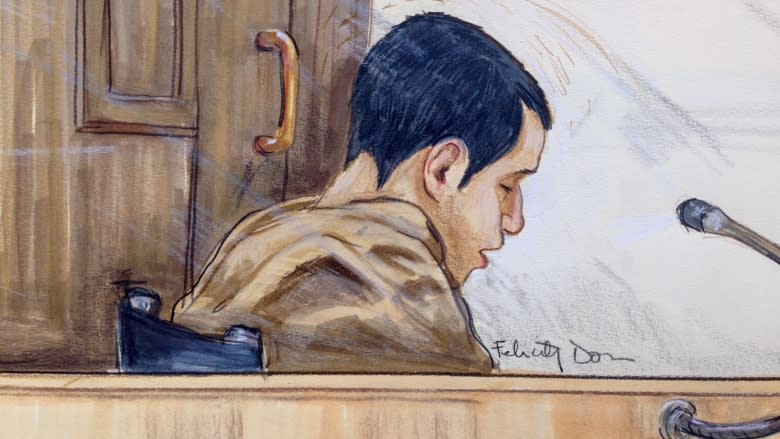Psychiatric assessment ordered for B.C. man accused of killing Abbotsford student
A tribunal tasked with determining the mental fitness of a man charged in the random killing of an Abbotsford high school student has ordered an independent psychiatric assessment.
The B.C. Review Board adjourned any decision on Gabriel Brandon Klein's fitness to stand trial for a 30-day period in order to gain greater clarity on his current mental state.
The decision followed a hearing that heard conflicting and somewhat muddied evidence about Klein's progress since a judge declared him unfit in April.
Overweight and unkempt, Klein shuffled slowly into the hearing room on the grounds of Port Coquitlam's Forensic Psychiatric Hospital on the arm of a plain-clothes guard.
Klein wore sandals, dark shorts and a dark sweatshirt pulled over a grey T-shirt. He sat down in a chair opposite the three review board members and asked, "What's going on?".
"You're at the review board," tribunal chairman Bernd Walter told him. "Did you know you were coming today?"
Mental fitness crucial
The 13-year-old victim's parents sat two rows behind as Klein stretched his arms and looked slowly from side to side during proceedings that lasted just shy of three hours.
He clenched and unclenched his fingers, occasionally running his hand through a tangle of black, unwashed hair.
The 2016 stabbing shocked the community of Abbotsford and devastated the victim's family. Klein was 21 years old at the time of his arrest. He also faces a charge of aggravated assault in an attack on another teenage victim.
Klein has schizophrenia and suffers from auditory hallucinations, paranoid delusions and thought disorder.
His lawyer, Martin Peters, told the hearing his client had admitted to killing one girl and assaulting another student.
If the case comes to trial, Peters will pursue a verdict of not criminally responsible by reason of mental disorder. But the B.C. Supreme Court proceedings came to a halt three months ago when the judge found him unfit to stand trial.
The issue of mental fitness is crucial, because an accused needs to be both physically and mentally present and able to participate in their trial in a meaningful way.
'Jesus told him he would be OK'
The questions the three-person tribunal wanted answered centred around Klein's ability to understand the legal system, the personal jeopardy he faces at trial and his ability to give instruction to counsel.
A representative for the psychiatric hospital claimed he was fit, but both Crown and defence recommended a finding of unfitness.
Treating psychiatrist Dr. Marcel Hediger said Klein's condition wasn't all that different from the way it was when he was first deemed unfit to stand trial in the spring.
Hediger said he spoke with Klein briefly before the hearing to try to get a grip on his state of mind.
"He indicated that he was feeling stressed," Hediger said. "He told me that he would [take part] because Jesus Christ told him to and that Jesus told him he would be OK at this hearing."
'He is quite significantly ill'
Klein has been through five different trials of anti-psychotic medication, but all to little effect.
Hediger said he's hoping to put Klein on a drug considered the "gold standard" of treatments, but Klein is averse to the accompanying tests that would see him regularly have blood drawn with a needle.
The psychiatrist said that while Klein was in the calm surroundings of the hospital, he might be mentally fit enough to take part in legal proceedings, but the stress of being in an actual courtroom might be enough to tip the balance to wards unfitness.
"He is ill. He is quite significantly ill," Hediger told the board. "It's going to be difficult for anyone at any point in time to declare if he's unfit or not."
The parents of the teen who died had planned to speak to the media after the proceedings, but a family spokesman said they changed their mind after what had been a stressful day.
He said they were mainly pleased that Klein wouldn't be released into the community at any point in the near future.
Read more from CBC British Columbia



